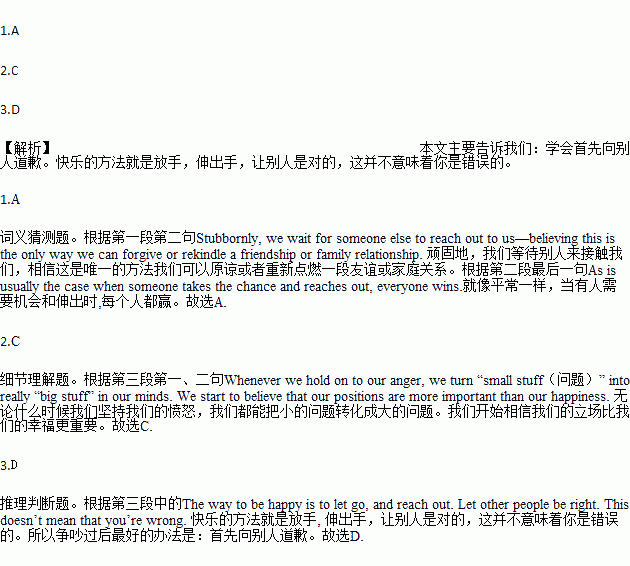题目内容
So many of us hold on to little complaints that may have come from an argument, a misunderstanding, the way we were raised, or some other painful events. Stubbornly, we wait for someone else to reach out to us—believing this is the only way we can forgive or rekindle a friendship or family relationship.
A friend of mine, recently told me that she hadn't spoken to her son in almost three years. She said that she and her son had had a disagreement about his wife and that she wouldn't speak to him again unless he called first. When I suggested that she be the one to reach out, she said, “I can't do that. He's the one who should apologize.” After a little gentle encouragement, however, she did decide to be the first one to reach out. To her amazement, her son was grateful for her willingness to call and offered an apology of his own. As is usually the case when someone takes the chance and reaches out, everyone wins.
Whenever we hold on to our anger, we turn “small stuff(问题)” into really “big stuff” in our minds. We start to believe that our positions are more important than our happiness. They are not. If you want to be a more peaceful person you must understand that being right is almost never more important than allowing yourself to be happy. The way to be happy is to let go, and reach out. Let other people be right. This doesn't mean that you're wrong. Everything will be fine. You'll experience the peace of letting go, as well as the joy of letting others be right.
You'll also notice that, as you reach out and let others be “right,” they will become less defensive and more loving toward you. They might even reach back. But, if for some reason they don't, that's okay too. You'll have the inner satisfaction of knowing that you have done your part to create a more loving world, and certainly you'll be more peaceful yourself.
1.The underlined word “rekindle” in Paragraph 1 probably means “________”.
A. recover B. develop
C. accept D. replace
2.In the author's opinion, we hold on to our anger often because we think ________.
A. we can turn small issues into big ones
B. our positions are higher than others
C. our own opinions matter most
D. others will be less defensive
3.The best thing to do after a quarrel is to ______.
A. let go of our own rights
B. realize that you are wrong
C. expect others to give in
D. apologize to others first


 tterflies! I thought abou
tterflies! I thought abou t our ______. She was happy to catch the butterfly and happy to see it go. Maybe she was right. Butterflies ______ nothing but happiness. Maybe butterflies aren’t exactly the ______ to happiness, but there is something to be said about the simple things in ______ . And with that, I started to write.
t our ______. She was happy to catch the butterfly and happy to see it go. Maybe she was right. Butterflies ______ nothing but happiness. Maybe butterflies aren’t exactly the ______ to happiness, but there is something to be said about the simple things in ______ . And with that, I started to write.
 on I noticed him.
on I noticed him.